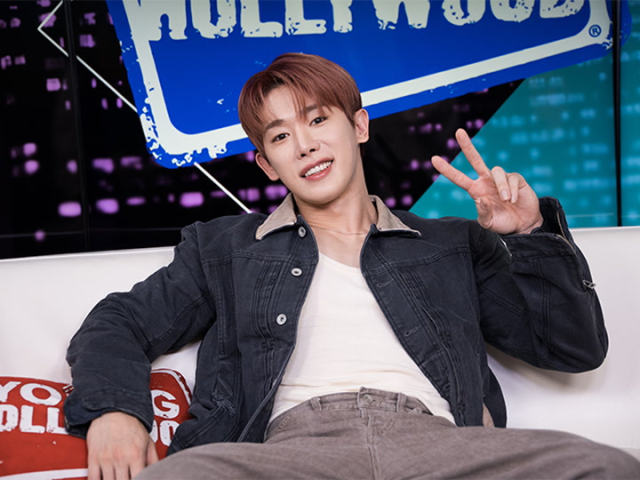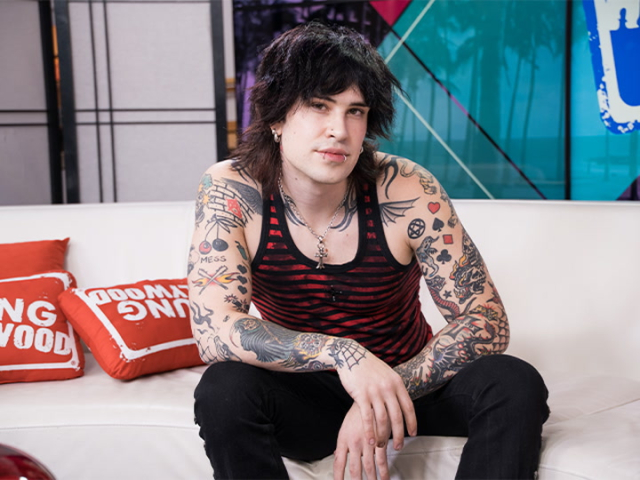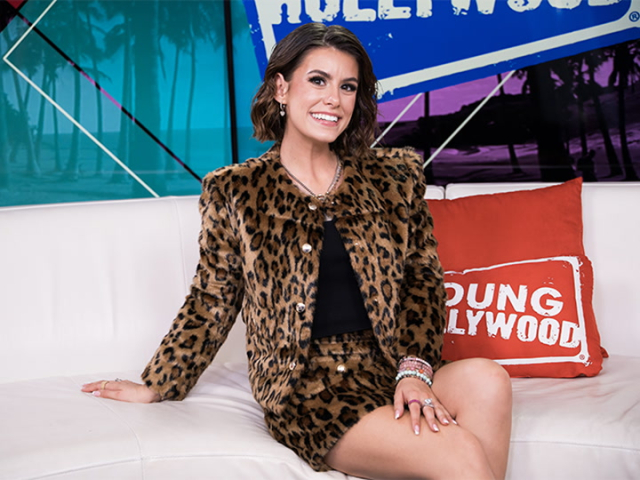"The Man In The High Castle" at Comic-Con '16: Getting Woke
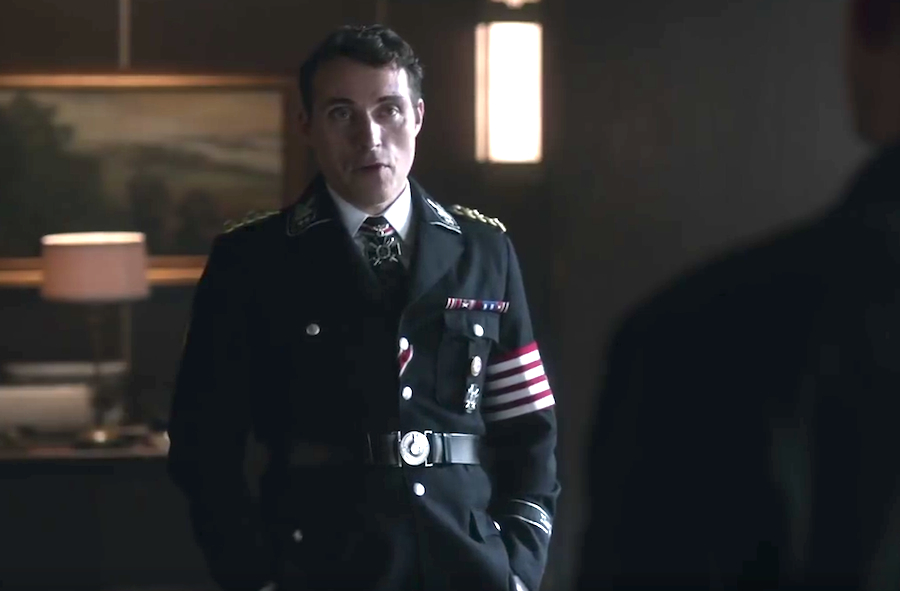
Amidst the madness of Comic-Con, the cast and executive producer of Amazon's “The Man in the High Castle” congregated to get the word out about the second season of the hit series, based on Philip K. Dick’s novel of the same name. The first season was a hit among critics and viewers alike, and the second season will debut in 2017, picking up right where the first season left off. “The Man in the High Castle” takes place in the 1960s in an alternate universe where the Axis powers won World War II, and the United States is divided in half -- the Japanese Pacific States and the Greater Nazi Reich. The series offers a glimpse into what life would be like under fascist occupation and how different individuals handle it. The second season will introduce a few new individuals, including Nicole Becker, a Berlin-born documentary filmmaker played by Bella Heathcote.
During our chat, the cast filled me on the research they did for their roles, what we can expect in Season 2, and how the show parallels today’s political climate...
Executive Producer Dan Percival
YH: What was it like to adapt Philip K. Dick’s work?
DP: You take anything by Philip K. Dick and you take it with reverence. Philip K. Dick was one of the greatest minds. The universes he created were so many years ahead of his time, and I don’t think it’s any surprise now that, 30 years after his death, we are still producing his work and finding new ways to interpret it. What’s lovely about “The Man in the High Castle” is that it’s set in 1962, so it’s set 17 years after the second World War. We’ve honored that. We’ve set our alternative history in the same period that he wrote the book. What is extraordinary to us is how the messages of that time are still resonant and relevant today, and even more so. The further we get away from the second World War, the further we get away from what the Nazis and the Japanese state represented to our parents' and our grandparents' generations, and it serves as a reminder to all of us how quickly and how easily the ideals of fascism appeal to us. I come from Europe, and in Europe we’re much more alert to the potential dangers of this because of our own history. In America, I think it’s very easy for two or three generations to pass and think, “Oh, that could never have happened.” Philip K. Dick wanted to remind us that all it takes is for the world to turn the other way, and the ideals and bigotry can take over again. All it takes is a slip in the economic system or a fear of enemies that may or may not be as real as what one imagines. That’s how quickly people fall into power who will you have believe this. Even in our democracies, we can be vulnerable. Hitler rose in a great democracy. He rose by convincing his nation that he would lead his nation out of a period of great strife, and they believed him and they followed him, and then we saw what he did. Let us not forget. That’s what Philip K. Dick wanted us to remember. All of us are capable of sliding into supporting something that can overwhelm us and overtake us. Bringing his vision to the screen has been a great pleasure.
YH: Why and how were certain songs picked for the show? For instance, “Mack the Knife” is a provocative song.
DP: Yes, “Mack the Knife” is a provocative song because it was written by a German Jew who fled to America, yet the song was still very popular in Germany. It was later banned by the Nazis, but it remained popular in America. The choice of music in the show is a very good question, actually, because we have had to imagine a world where the popular culture post-War never happened -- rock and roll never happened. We had to consider what music would have survived and what wouldn’t, and what would have replaced the music that didn’t survive. Under the Nazis, there would not have been any Jewish or Black artists. However, some of the artists have survived because they fled to Canon City and the Japanese States, because the Japanese were not as strict as the Nazis. So, every piece of music we feature, we think very carefully about the symbolism and the existence of it. We talked a lot about creating music that would be very early rock and roll that would have survived totalitarianism. In Eastern Europe, during Communist rule, a lot of underground clubs came up, and you will begin to see those in the second season.
YH: How much research did you do in terms of costumes?
DP: Between the pilot and the first episode of the first season, we put a ton of work into this. In the pilot episode, we made all the references to the 1940s. But then we started to think, hang on, they’re almost 20 years ahead of that, so how would the Nazi uniforms have evolved? How would soldier uniforms have evolved? How would consumer culture have evolved? Again, when you take away pop culture and the big designers in fashion, what would fashion look like? There are plenty of examples in history and around the world that show fashion becoming more conservative because nothing new gets introduced. What would the fashions of 1930s and '40s Germany have mixed with the conservative values of 1950s America? When you look at the West Coast, you look at how the Japanese influence would have influenced fashion. You also consider distinct color palettes for each world. Audrey Fisher, who was our costume designer, never stopped doing research -- she is quite brilliant. She considered the badges, the jewelry, and even the buttons on clothes. We had to consider, would this have existed or not, as well as which designers would have survived under the Nazis.
YH: Does today’s political culture influence the message of the show?
DP: Funny enough, no. This show’s been 10 years in its creation. In a way, the world has caught up with the message of the show rather than the other way around. I was very taken with the press by how many people were drawing parallels with the message of the show to today. We’re just telling the story that Philip K. Dick created. He writes very universal stories in alternative universes.
Cast Members Rufus Sewell (Obergruppenfuhrer John Smith), Luke Kleintank (Joe Blake), Bella Heathcote (Nicole Becker), Alexa Davalos (Juliana Crain), Rupert Evans (Frank Frink), and DJ Qualls (Ed McCarthy)
YH: How would you describe the dramatic thrust of Season 2?
RS: It’s really good. It’s great. Okay, great interview... [pretends to leave the table, laughs] There’s two different journeys for Smith -- there’s his external journey and his internal journey. It’s not even as simple as that. He ended Season 1 with a particular predicament, and he also ended it on a bit of a high career-wise, because he’s been a good boy so far as the Fuhrer is concerned. What will be interesting is that his beliefs -- the beliefs that he has given his life over to -- is under attack because of the belief system that tells him he can’t have his son. I think he has had misgivings about the choices he has made, but he has staked his family and future on this particular side. I think the frightening side of his fundamentalist beliefs are also fueled by his own doubt. I think all of that will be stoked in Season 2.
LK: [Joe]...he’s changing. He’s going deeper and deeper into his own personal life. He’s going deeper into the Nazi life. He’s going into the lion’s den. He can either face the lion and face it, sit down, and let it eat him, or run away. He’s faced with that conflict. That’s the big question for him: can he affect change? We will find out more about Joe’s past, and why he’s doing what he’s doing, who he is, and where he comes from.
AD: We really don’t have enough time to get into all that. I’m blown away by this season for a number of reasons. The first season was the beginning and introduction to this world, but this season, we are really able to get into the meat of these characters and find out more about them. We get to go on these adventures with them that are sort of different. I can’t tell you everything, but I really want to. Juliana, for example, is in a place that I can’t discuss because it will ruin everything. It’s been very interesting and exciting.
DQ: The theme of this season is the cracking. You see the breaking down of being under Japanese rule and under the Reich. You see underneath the veneer on one side and underneath the 1950s utopian control on the other side. That pushes us all further away from each other. When something starts to change, like for my character, safety is a big concern. Living under Japanese occupation is awful and it sucks, but if you put your head down, you’ll live. You will have money to pay your rent and be able to eat. That’s all you could hope for. But as my friend starts to get away from that, based on what has been done to him, I start to lose my safety. That old life is no longer an option, and I have no choice but to go along with him. As I go along with him, I start to resent him. Change makes you angry. We are seeing that across the board with every single one of our characters -- change is making them angry.
RE: We leave Season 1 in an extraordinary place. There’s a huge fallout from the end of Season 1, and that’s looked at early on in Season 2. Everything has changed for everyone, and life will never quite be the same. I think Season 2 for Frank Frink is, he is trying to work out how to live his life now. He starts to make choices rather than try to fit in and confirm as he did in Season 1. He actually makes dramatic choices. He starts to stand up and have an opinion on how to live in this crazy world. He’s in a dark place.
YH: Rufus, will we see another version of Smith (possibly in an alternative universe)?
RS: It’s possible. But what I believe is very important -- and what is done well in the first season -- is that if we embark to other universes too soon, the currency that we have established will be lost. It’s like when films have too many flashbacks and flashforwards, you don’t invest in what you are watching because you think that it’s a dream. It’s very important to establish the reality as the main currency first. I think that, in the world that we are in, his life and his currency is rich enough. I would not like to spread it out too quickly. I am very interested to see an alternate world. I would not worry about that now.
YH: Rufus, were there any particular Nazis you based Smith off of?
RS: No. I wanted him to be a new person. I don’t mean a new type of Nazi. He’s in a very particular predicament. He’s someone who has taken on the belief system of the victor and convinced himself that he’s on the side of the right. He doesn’t see himself as a traitor but as a patriot. He believed that joining the Nazis would help save his country from death and Communism. He believes that it was an act of heroism. He believes this because people tell themselves these stories. What I did do is I read Albert Speer’s autobiography. I didn’t read the book, The Man in the High Castle, because a very quick Google search informed me that my character wasn’t in it. You don’t want to find that out by the time you get to the last page. So, I also read The Rise and Fall of the Third Reich. I read that because we all know how the degenerate people started the Nazis, but then all of Germany became deviant monsters. Maybe there were certain cultural and psychological factors that led to this, but it spread. What was the story that people told themselves that they were good people and could do this? One of the most incredible things was, towards the end of the war, when finally [Joseph] Goebbel’s propaganda was no longer believed by the German public, the only way he could influence the German people was through horoscopes. This is a clue of how to get into people’s minds.
YH: Do you see the show as a cautionary tale for the times we live in now?
RS: I can’t help but think that. At that time, it was also a cautionary tale, and that’s still true today. One thing that is interesting about the show is that you do not have to push cutesy '50s Americana far at all for it to fit with the Nazi ideal. There aren’t many people you need to remove from the picture. There were still celebrations of mass murder. For me, what Philip K. Dick was writing about was how people get on in life. How people continue day to day despite whatever, and that evolves telling yourself you’re the good guys. This is how people become enamored with their captors. It’s dangerous how easily people accept.
LK: I think the show is a message that, as a society, we need to wake up and that these things are real. In the world we live in today, there is fear and greed. That’s the beautiful thing about these characters is that they believe in more than that; we embrace one another as individuals. I think that the message is to wake up and embrace peace.
YH: Bella, Can you tell us about your new character? Who is she?
BH: I play Nicole Becker. She’s a documentary filmmaker. She’s passionate about the environment. She’s very privileged and wealthy, which allows her an independence she would not have been able to have had that not been the case. She loves to party and she loves to flirt, and she really likes Joe Blake.
LK: Can you blame her? [laughs]
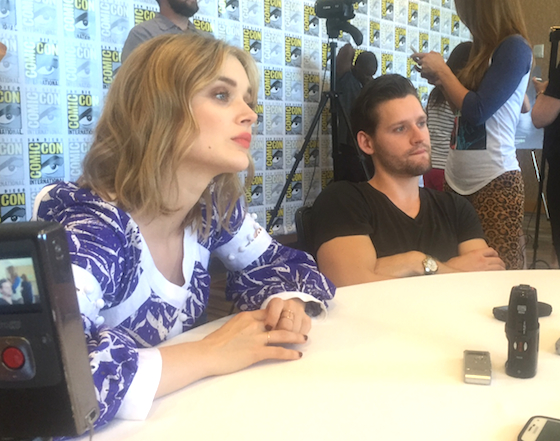
YH: Why do you think she is drawn to Joe?
BH: I think because he’s completely unlike anyone that she would have grown up with. She’s part of this new generation of Nazis, who are the offspring of the perpetrators of these crimes. But I don’t think we are into these ideologies. I wouldn’t exactly call us hippies, but we’re really into the environment and nature. We are not these evil Nazi types. At the same time, Joe grew up in a different world, and I think that fascinates her. He’s not some privileged rich kid like she is.
YH: Are there any moments in Season 2 you are excited for us to see?
LK: The last one we filmed. I can’t say why.
BH: I’m really excited to see it and how it turns out.
LK: Just remember that Episode 6 is going to be great for Nicole and Joe.
YH: Did any of you read any books in preparation for your role?
BH: Leni [Riefenstahl]’s memoir. It’s such a good read. I feel like everyone should read it. It’s just like, “I was at this party and then Hitler made a pass at me.” It’s wild! It’s fantastic gossip. I loved that book. I read a bunch of stuff about Leni. I read about women of the time. I was trying to create this type of woman who I haven’t played before.
LK: I read the novel The Man in the High Castle multiple times. Other than that, I’ve watched documentaries about WWII on what it is to be a Nazi, so that I could understand that world.
AD: I am a research fiend. I love to read. I did a lot of research. I did a film years ago that was a WWII piece, and I did so much research that I didn’t sleep for quite a while. For this, though, I studied Japanese culture and those aspects that are really important for Juliana, being that is the world she grew up in, in the way that she moves (which is quite different from me). There’s so much research to be done about what it’s like to live under an incredibly low ceiling.
RE: I read the novel. That was the first thing I did. Here in mainland America, we have never been occupied. It’s a really different feeling and a different approach to life. That was my focus -- what would that be like? I read a lot and I watched a lot of movies. I watched Bridge Over the River Kawaii and Schindler’s List -- those kind of films were very useful for me, where you see a community or race being completely subjected to appalling conditions.
DQ: I didn’t do any research. [laughs]
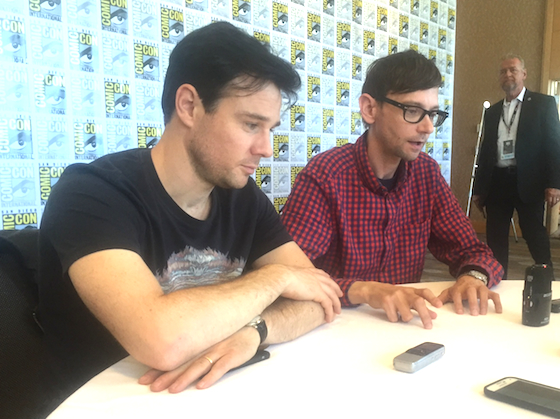
YH:
Alexa, how challenging was it to learn Aikido?
AD: It was incredibly challenging but incredibly fascinating. It’s like a moving meditation, which is something I didn’t expect. I’ve done martial arts over the course of my life, and I’ve certainly never done something like that, where there is a stillness to the movement, and if you are not focused, you can’t do it. It is very much like a meditation.
YH: D.J., you grew up fairly near Graceland. What was the strangest thing you’ve ever seen at Graceland?
DQ: Everybody makes the pilgrimage to Graceland growing up. I remember going there when I was six years old, and I peed my pants on the way there. When we get to Graceland, it starts to rain, I’m in yellow shirts covered in piss, my mother standing there in giant 1970s vacation sunglasses bawling her eyes out because Elvis is dead. He had died years before that. That’s the weirdest thing I ever saw.
(Screenshot via YouTube)
- Sarah Osman, YH Contributing Writer

